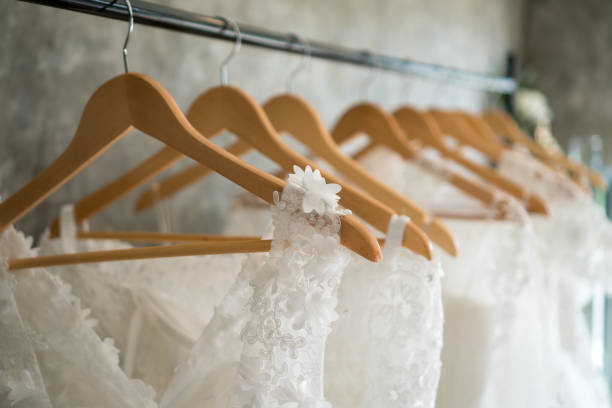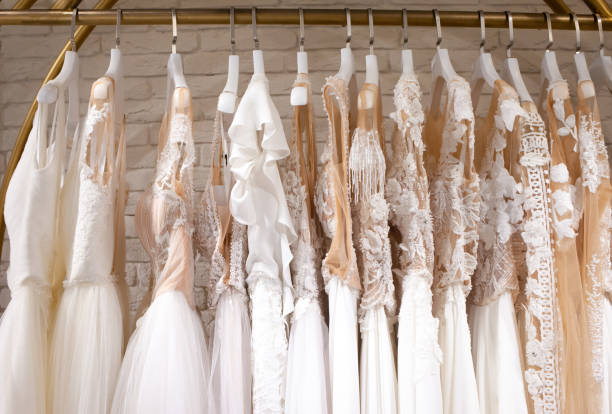Now that the wedding is done, you can finally take that honeymoon you've always dreamed of. So, after giving your schedule one more once-through, pack your bags, and enjoy the rest of your newlywed bliss! Except… Do you have a plan for your wedding gown?
It's common for the bride to overlook the need to clean her wedding dress and accessories, such her veil, right after the big day. To a lesser or greater extent, the cloth will absorb your body oil and sweat, leaving behind yellowish stains that may be permanent if not laundered. That's a terrible thought to consider. You may kiss your hopes and dreams of looking flawless in that expensive designer dress goodbye because someone neglected to take it to the cleaners.
If you don't take the time to preserve your wedding dress, you might as well toss it. It's good news because cleaning and preserving your wedding dress is something that can be organised in advance. Event and wedding planners may offer to take care of this for you, especially if they have a prefered vendor they can negotiate a discount with to save your dress. However, if you absolutely must have your dress back on your honeymoon, you can make arrangements in advance and have a friend drop it off, just as you'll have someone return all the tuxedos.
Let's speak about how to take care of your couture wedding dress or the one you lovingly designed yourself so that it can be worn again and again and even passed down to a daughter or other loved one.
How to Preserve Your Wedding Gown

It Is Essential That The Dress Be Cleaned Initially
You should wash the clothing well before beginning the preservation process. It's up to you whether you want to clean the clothing at home or send it to the cleaners. This will eliminate the possibility of any discoloration or other damage to the dress. It's likely that the stains on the garment will become permanent if you try to preserve it without having it cleaned beforehand.
If you opt to launder the dress yourself, familiarity with the fabrics used in bridal gowns is essential. If your dress is made of a soft fabric, then you shouldn't wash it in regular detergent. Your dress will not survive if you iron it or use bleach on it. The iron will melt organza and polyester, and bleach will make non-cotton fabrics yellow.
Check the Care Guidelines
Always double-check the care label or directions before attempting to clean your wedding gown. Even though you're not usually the kind to do so, please follow our instructions on this, a very special occasion.
Knowing the guidelines is important whether you plan to clean the garment yourself or send it to a dry cleaner, since there may be particular instructions on there.
Consider Dry Cleaning Your Wedding Dress
Dry cleaning is the best option if you want to extend the life of your wedding dress. However, only a dry cleaner who specialises in preserving wedding gowns should handle your gown. In this approach, the optimum method for cleaning can be determined after considering the fabric, seams, and other features.
Because accidents might happen even if you take extra precautions, it's best to get the dress cleaned by a professional before the big day. Some things should be remembered while looking for a reliable wedding dress cleaning service.
You must first verify that they use fresh solvents in their processes rather than recycled ones. In most cases, the use of recycled chemicals in the dry cleaning process will result in a musty odour being left behind on your clothing.
As an added precaution, ensure that the replacement value of the clothing (and not simply the cost of preservation) is covered in the event of loss or damage. Losing both your wedding dress and your savings at the same time is a nightmare.
Time Matters
When it comes to rescuing a wedding dress, time is essential. It is a terrible idea for many brides to wait six weeks after the wedding before having their garment dry cleaned.
In order to preserve the beauty of your wedding dress, take it in for dry cleaning as soon as possible once the big day is over. This might be handled by one of your bridesmaids. More time passes after a spill before it is cleaned, the more permanent the stain becomes on the fabric.
Follow the Rules When Cleaning Your Own Dress
If you plan on cleaning your wedding dress yourself, there are a few precautions you should take. Before going crazy with the cleaning products, make sure they won't cause the fabric to fade or run by testing a small area. Don't use bleach on anything, and if there are any little stains, try brushing them out with a soft-bristled toothbrush.
Handle the Dress With White Gloves
Wearing white cotton gloves when handling your wedding dress is a good idea before, during, and after having it dry cleaned, even if it seems superfluous at the time.
Look for an Airtight Wedding Dress Box
You should invest in a wedding dress box with a pH-neutral environment if you want your gown to remain in exquisite shape for decades to come. If you opt for a standard box, your prized dress is more likely to lose its vibrant colour and take on a yellowish tone with time. Considering you'll be keeping this box for the rest of your life, it's important to get one that is both durable and attractive.
Use Acid-Free Paper to Store Your Dress
You should get acid-free paper if you intend to keep your bridal gown for a long period. If you are wearing light-colored clothing, the ink from other papers may transfer to your skin. Dresses should be kept in acid-free paper and the bridal box they were purchased in. Pack it in a secure wrap.
The best way to store your wedding dress is in acid-free tissue. Put the tissue in between the garments as you fold them.
Care instructions and acid-free tissue should be included in the box where you keep your wedding images. While regular tissue paper will get acidic and destroy the dress over time, acid-free tissue paper will keep the fabric in pristine condition.
Avoid Light, Heat, and Dampness
It's probably best to keep your wedding gown in a separate room if you have one. Keep the wedding dress in a cool, dry spot out of the sun and away from any sources of heat or moisture.
For optimal preservation, a dark, dry, and cool environment is required. You know that the drapes and carpet in your home fade when exposed to direct sunlight, therefore you should protect your dress from the sun as much as possible.
As temperature changes from outside can also be problematic, you shouldn't set the box against an exterior wall.

Use a Wedding Dress Preservation Service
It is possible to cause irreparable harm to your wedding garment by failing to use adequate packaging and wrapping techniques. Correct preservation requires a hermetically sealed container with internal and external temperature and humidity monitoring systems. Think about spending money on a wedding dress preservation service if you want to make sure your dress stays in beautiful condition for years to come.
Here's what you need to know about preserving a wedding dress if you're thinking about having a professional do it for you.
Select a Reliable Preserver
Get these things taken care of before you head out to your local wedding dress preserver:
- Learn much you can about preserving a bridal gown.
- Look for reviews online and ask around to see if anyone you know has used a particular preserver that they can recommend.
- When choosing a company, seek for a warranty against yellowing, museum-quality materials, a free assessment before the gown is preserved, and acid-free rather than acid-neutral.
Check to See if the Gown Has Stains
Both of you will probably inspect the gown for stains before the cleaner gets to work. First, make sure the buttons and zipper on your clothing are operational. During your wedding day, your bustle points are especially vulnerable to tears, so be sure to let your bustle down and inspect them carefully. It is recommended to double-check if all beads and other embellishments are securely attached and asking if there are any additional adjustments that need to be made.
Removing Stains
Your preserver will use specialised techniques to remove any and all stains from your wedding dress, whether or not they are visible to the naked eye. This is especially important if you plan on dancing the night away in your newfound forever gown. When left to dry, white wine, ginger ale, and cake do not automatically disintegrate in dry cleaning solution. To keep the sugar from developing an unappealing brown colour, an additional process is required to ensure that these hidden stains are cleansed and eliminated.
The gown is machine-washed to remove any lingering residue from the cleaning chemicals once the stains have been removed. Putting your robe through a few cycles of washing, extraction, and drying will ensure that it emerges entirely dry, so you can wash it without fear of ruining it. Then, your garment will be pressed by a professional to remove all of the wrinkles.
Gown Storage
Your cleaner should be able to pack your gown with or without your presence. The second most important factor in the maintenance of your gown is the materials you use to keep it. To prevent the dress's delicate folds from deteriorating, Conant recommends storing it in an acid-free wedding chest lined with acid-free paper. The acidic component of common paper and paperboard can scorch your gown exactly like a hot iron if you aren't careful. Never go near a pH-neutral wedding chest, as they rapidly turn acidic when exposed to water.
Seal the Gown
After the dress has been folded and placed in the box, it is sealed. Almost all formal wear is kept in nitrogen-filled canisters for long-term storage. It will be easier to keep the dress in pristine condition for a longer period of time if oxidation is avoided. The dress ages, fades, and becomes damaged as a result of oxygen.
Select a Storage Location
Conserving the bridal dress by storing it in a cool, dark spot. The bridal gown needs to be kept in a cool, dark place to avoid fading and discoloration. Do not open a nitrogen-filled, airtight container while it is being stored. This will allow the nitrogen to maintain its protective atmosphere and preserve the contents.
If you've gone to all the bother of maintaining your wedding gown, you should wear it at least once and enjoy the attention you'll get. Keeping the item out of storage on a regular basis will also keep it from becoming too wrinkled to be worn again. You can take it out and look at it whenever you choose.
And keep in mind the bigger picture! It's a lot of work, but after the wedding is over and everyone has left and the cake is gone and the band has packed up and gone home, all you'll have left is your wedding outfit and the photos (and your new married name, husband, etc. of course). You're responsible for their care.
Veils may be stored in the same box as wedding dresses without touching the gown, however this is not recommended. The dress could be ruined by the plastic, wire, or trim of the headpiece or veil. Protect the dress and veil by keeping the shoes and crinoline in a different bag.
If you want to pass your wedding gown down through the generations, donate it to a museum, or sell it, you need to take the proper steps to preserve it. Some brides carefully store their gown for a few months before deciding whether to sell it online or consign it at an expensive boutique. Some people preserve their wedding gown as a memento with their wedding cards, photographs, and other mementoes.
No matter what you decide, you should always treat your wedding dress with the care it deserves because of the special place it holds in your heart because of the day you wore it.
FAQs About Wedding Dress
Conclusion
After the wedding, it's easy for the bride to forget that she needs to clean her dress. If you don't wash the fabric soon after wearing it, it will absorb your body oil and sweat, turning it a yellowish colour. Planning ahead will allow you to have your wedding gown professionally cleaned and preserved. Learning about the materials used in wedding dresses is crucial if you plan to clean the dress on your own. Washing your dress in regular detergent could damage the delicate fabric it's made from.
Applying heat or bleach to your dress will ruin it. Before, during, and after having your wedding dress dry cleaned, it's a good idea to handle it with care by always donning a clean pair of white gloves. If you want your wedding dress to remain in pristine condition, you should purchase a box that maintains a pH balance. The fabric can be preserved for the long term in pristine condition with acid-free tissue paper. Inadequate packaging and wrapping techniques can result in severe damage to your wedding dress.
A hermetic container with both internal and external temperature and humidity monitoring systems is necessary for proper storage. Your wedding dress will be spotless after your preserver uses their special techniques to eliminate them. Keeping the wedding gown out of direct sunlight and cool temperatures will help preserve it for future brides. For long-term preservation, nearly all dress clothes are stored in nitrogen-filled containers. Thus, the nitrogen can keep its protective atmosphere and keep the contents safe.
If you want to resell or donate your wedding dress, you should give it the TLC it deserves. Some future brides hang on to their dresses for a while before deciding whether to sell them online, donate them to a museum, or put them up for consignment.
Content Summary
- If you don't take the time to preserve your wedding dress, you might as well toss it.
- It's good news because cleaning and preserving your wedding dress is something that can be organised in advance.
- It's up to you whether you want to clean the clothing at home or send it to the cleaners.
- If you opt to launder the dress yourself, familiarity with the fabrics used in bridal gowns is essential.
- Always double-check the care label or directions before attempting to clean your wedding gown.
- Some things should be remembered while looking for a reliable wedding dress cleaning service.
- In order to preserve the beauty of your wedding dress, take it in for dry cleaning as soon as possible once the big day is over.
- The best way to store your wedding dress is in acid-free tissue.
- Keep the wedding dress in a cool, dry spot out of the sun and away from any sources of heat or moisture.
- It is possible to cause irreparable harm to your wedding garment by failing to use adequate packaging and wrapping techniques.
- Think about spending money on a wedding dress preservation service if you want to make sure your dress stays in beautiful condition for years to come.
- Your preserver will use specialised techniques to remove any and all stains from your wedding dress, whether or not they are visible to the naked eye.
- The second most important factor in the maintenance of your gown is the materials you use to keep it.
- After the dress has been folded and placed in the box, it is sealed.
- Almost all formal wear is kept in nitrogen-filled canisters for long-term storage.
- Conserving the bridal dress by storing it in a cool, dark spot.
- The bridal gown needs to be kept in a cool, dark place to avoid fading and discoloration.
- Keeping the item out of storage on a regular basis will also keep it from becoming too wrinkled to be worn again.
- Protect the dress and veil by keeping the shoes and crinoline in a different bag.
- If you want to pass your wedding gown down through the generations, donate it to a museum, or sell it, you need to take the proper steps to preserve it.

